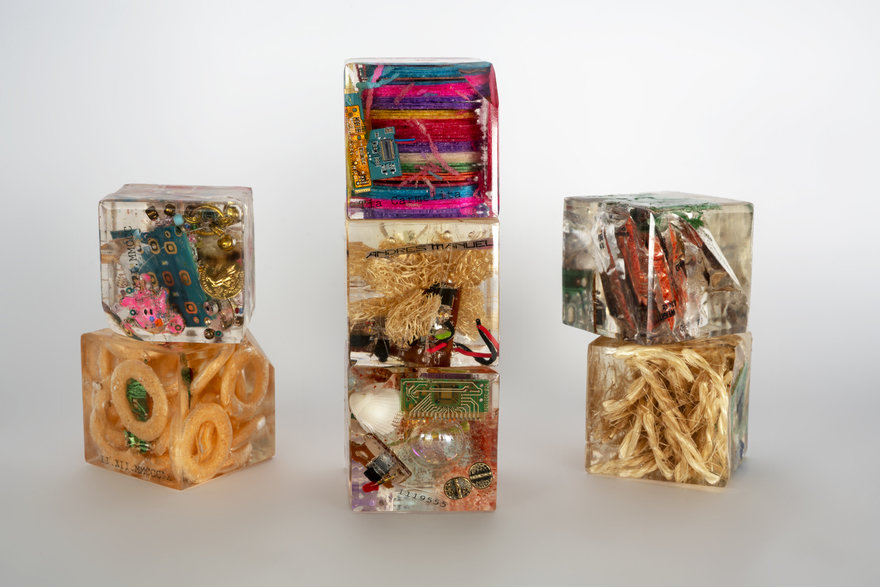Notable
Design Education Initiative Award
Core77 Design Awards 2020
Dreamt in Mexico. The Global Futures Lab Observatory in Mexico City
The Global Futures Lab Observatory in Mexico City (GFL/MX) it is part of a larger project, the Global Futures Lab, founded by Paolo Cardini (RISDI). The Global Futures Lab is a series of international workshops that aim to counteract the bias and stereotypes of so-called "Western futures" and foster different futures linked to specific geo-cultural locations. Students from Isfahan (Iran), Ahmedabad (India), Lima (Peru), Addis Ababa (Ethiopia), Havana (Cuba) and Mexico City (Mexico) were invited to reflect on their environments, traditions, and beliefs, and to envision futures respectful of their cultural needs and coherent with their distinct idea of progress.
The Observatory aims to provide hyper-contextual future visions through techniques and methodologies that range from critical design and traditional future forecasting to speculative anthropology. The core of the initiative is the will to address the lack of diversity within the speculative design field, heavily based on northern European and North American perspectives. Since the start of the GFL/MX initiative, different cohorts of Mexican students have been invited to develop future scenarios in which identity and cultural factors have priority over technology and the predominant western idea of progress. In these pages, we will analyze the pedagogical model of the GFL/MX workshops.
The Lab in Mexico City, lead by Paolo Cardini and coordinated by Karla Paniagua, takes place at CENTRO Advanced Design Institute once a year. However, after the end of the workshop, the students keep developing their design proposals with the support of the program's faculty. Each sprint is organized into three main phases: Stories, Scenarios, and Products. During their first session, students are challenged with the writing of a short fictional story. Everyone is invited to write about a hypothetical situation happening in Mexico, in an undefined future. The frame of the exercise is intentionally kept very loose and the only constraint is about the fact that the stories shouldn't talk about major systems or about society at large but rather focus on everyday events in someone's life. Within this exercise, it's fundamental that the students use their first language to populate their stories with words, expressions, and behaviors typical of their culture. The second session is based on the exploration of details and nuances from the short stories to better define their scenarios. This process starts with the reading of everyone's text and the following debate. The stories' conciseness leaves plenty of blank spaces to be filled by the creativity of the rest of the group who contribute to expanding each scenario with new and unexpected elements. The third and final session focuses on the ideation and materialization of the diegetic prototypes. Students are asked to populate their scenarios with fictional objects and products that belong to those futures. Students design what the objects do, how they work, who they are for, and where they exist. The final goal of those fictional artifacts is to carry the essence of their narratives and act as facilitators for conversations around students' future speculations.
 Anima by Ana Gutman & Lizah Pesah
When a person dies in a digital way, leaves the essence of the identity inside these cubes called Animas.
CENTRO by Jasso
Anima by Ana Gutman & Lizah Pesah
When a person dies in a digital way, leaves the essence of the identity inside these cubes called Animas.
CENTRO by Jasso
 Ovotril by Alan Saenz
The traditional medicine is on the big laboratories hands.
CENTRO by Jasso
Ovotril by Alan Saenz
The traditional medicine is on the big laboratories hands.
CENTRO by Jasso
 The box of life by Matilde Breña
Committing suicide is the new normal, when you turn 20 will receive this box containing a letal pill from your parents.
CENTRO by Jasso
The box of life by Matilde Breña
Committing suicide is the new normal, when you turn 20 will receive this box containing a letal pill from your parents.
CENTRO by Jasso
 Mexican Identity Manual by Camila Anaya
A manual that determines how to be Mexican in a totalitarian context.
CENTRO by Jasso.
Mexican Identity Manual by Camila Anaya
A manual that determines how to be Mexican in a totalitarian context.
CENTRO by Jasso.
 Chinampa Ring by Alejandra Rosillo
The seeds are scarce and precious as jewels, these rings are used to preserve and mobilize them in the black market.
CENTRO by Jasso
Chinampa Ring by Alejandra Rosillo
The seeds are scarce and precious as jewels, these rings are used to preserve and mobilize them in the black market.
CENTRO by Jasso
 The process
The process
 The process
The process
 The process
The process
This project questions the universal and homogeneous visions of the future, so the participants of this workshop explore local, multiple, folk visions of possible futures. From a critical and speculative angle, the students of the postgraduate studies of Futures of CENTRO Advanced Design Institute participate in this experience created by Paolo Cardini and coordinated by Karla Paniagua. How to decolonize our future visions? It is one of the critical questions that we intend to answer.
Core77 Design Awards 2020
- Built Environment
- Commerical & Industrial Equipment
- Consumer Technology
- Design Education Initiative
- Design for Social Impact
- Furniture & Lighting
- Health & Wellness
- Home & Living
- Interaction
- Packaging
- Personal Accessory
- Service Design
- Speculative Design
- Sports & Recreation
- Strategy & Research
- Tools & Work
- Transportation & Mobility
- Visual Communication